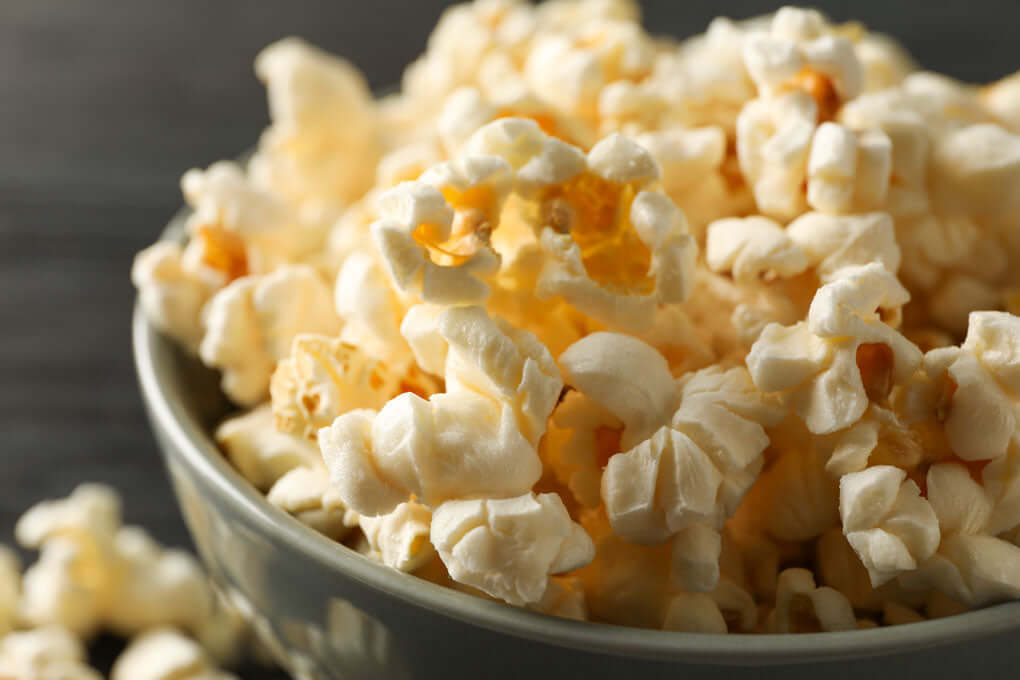
Popcorn: A Nutritional Analysis of Health Benefits
Popcorn is a beloved snack enjoyed by people of all ages. Whether you're settling in for a movie night, hosting a gathering with friends, or simply craving a satisfying treat, popcorn never fails to hit the spot.
No wonder it’s considered one of the most popular snacks in the whole world. However, there is more to popcorn than just its delicious taste. In this article, we will explore the nutritional analysis of popcorn and delve into its surprising health benefits.
Nutritional Analysis
When it comes to snacking, it's important to choose options that offer some nutritional value. Let's take a closer look at the nutritional composition of popcorn:
- Whole Grain Goodness: Popcorn is made from whole grains, which means it retains the bran, germ, and endosperm, unlike refined grains. This makes popcorn a rich source of dietary fibre. Fibre plays a crucial role in digestion, helping to maintain regular bowel movements and prevent constipation. Additionally, fibre contributes to satiety, keeping you feeling full for longer periods and aiding in weight management.
- Low in Calories: One of the significant advantages of these corn snacks is its low-calorie content. Air-popped popcorn contains only about 30 calories per cup, making it an excellent choice for weight-conscious individuals. By enjoying even flavoured popcorn as a snack, you can satisfy your cravings without sabotaging your calorie intake.
- Healthy Carbohydrates: Popcorn is primarily composed of carbohydrates, providing a quick and easily accessible source of energy for the body. These carbohydrates are slowly digested, leading to a more sustained release of energy. Unlike processed snacks that are high in refined sugars, popcorn offers a healthier alternative to fuel your body.
- Micronutrient Boost: While popcorn is not a significant source of vitamins and minerals, it does contain small amounts of important nutrients such as magnesium, phosphorus, zinc, and manganese. These minerals play various roles in maintaining overall health, from supporting bone health and immune function to aiding in enzyme activity.
Digestive Health
Fibre is essential for a healthy digestive system, and popcorn is a fibre-rich snack. The insoluble fibre found in popcorn helps add bulk to the stool, preventing constipation and promoting regular bowel movements. It also acts as a prebiotic, providing nourishment for the beneficial gut bacteria. By supporting a healthy gut microbiome, popcorn contributes to improved digestion and overall gut health.
Antioxidant Powerhouse
This beloved snack contains a surprising amount of antioxidants, particularly polyphenols. These compounds help protect the body against harmful free radicals and reduce the risk of chronic diseases, such as heart disease and certain types of cancer.
In fact, research has shown that popcorn contains higher levels of antioxidants compared to some fruits and vegetables. Enjoying a bowl of popcorn can be a delicious way to incorporate these powerful antioxidants into your diet.
Weight Management
When it comes to managing weight, popcorn can be a dieter's best friend. Its low-calorie content allows you to enjoy a larger portion size without consuming excessive calories. The high fibre content also helps keep you feeling full and satisfied for longer, reducing the likelihood of overeating. By opting for popcorn as a snack, you can curb cravings and promote weight control as part of a balanced diet.
Whole Grain Benefits
As a whole grain snack, popcorn offers several benefits associated with a diet rich in whole grains. Studies have shown that individuals who consume more whole grains have a lower risk of heart disease, type 2 diabetes, and certain types of cancer.
Whole grains are packed with nutrients, including fibre, vitamins, minerals, and phytochemicals, which collectively contribute to improved health. By choosing popcorn as a whole grain snack, you can enjoy the benefits of a wholesome grain while satisfying your snack cravings.
Gluten-Free Option
For individuals with gluten intolerance or celiac disease, finding gluten-free snacks can be challenging. Fortunately, popcorn is a naturally gluten-free snack, making it an excellent option for those following a gluten-free diet.
It offers a satisfying alternative to traditional corn snacks that contain gluten, such as pretzels or crackers. By choosing popcorn, individuals with gluten sensitivities can still enjoy a flavorful and crunchy snack without worrying about the negative effects of gluten on their health.
Popcorn is not only a tasty snack but also a surprisingly nutritious choice. Packed with fibre, antioxidants, and whole grain goodness, popcorn offers numerous health benefits. From promoting digestive health and aiding in weight management to providing a gluten-free option and contributing to dental health, popcorn proves to be a versatile and wholesome snack.
